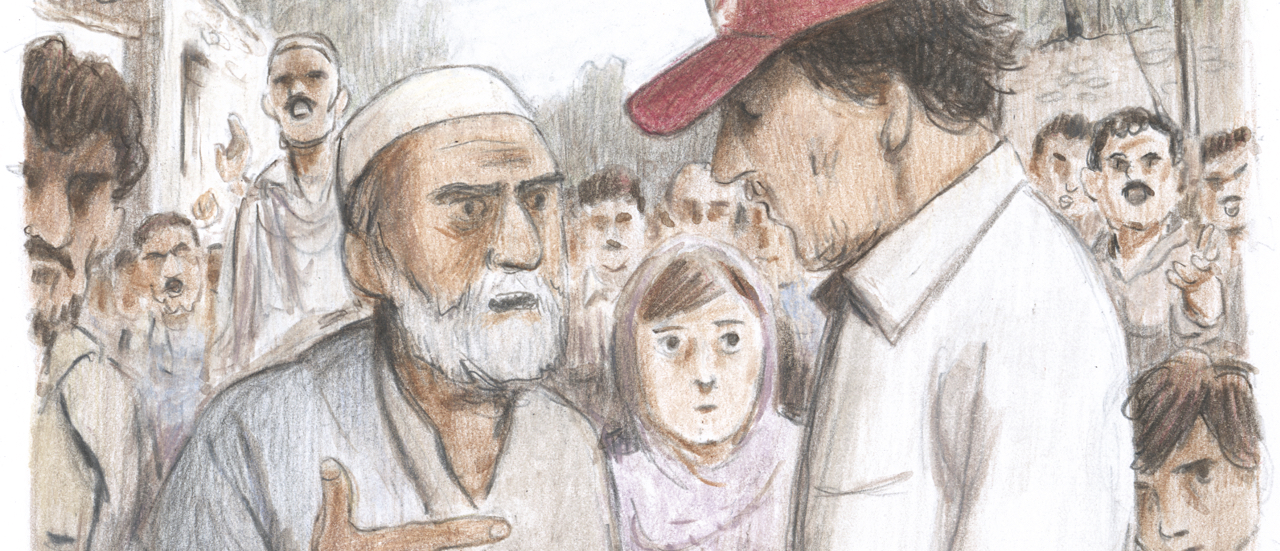A day of dilemmas
Kakar had joined a year earlier and by the time the Damani dam broke in 2009, he was an experienced and well-trained volunteer. It happened to be Kakar’s turn as team leader for the food distribution on that dramatic day. Before the distribution, the branch contacted local officials in the area and made the usual arrangements for a distribution. As is often the case in such situations, when Kakar arrived a this destination with 25 trucks full of food parcels, the people clustered around the convoy to receive desperately needed supplies.
But as the team was unloading, a man approached and introduced himself as a local leader. He said he knew who needed help the most and so he wanted to take over the cargo and distribute the food, thereby strengthening his prospects of winning upcoming local elections.
Kakar knew that to accept this demand would compromise the principle of impartiality, with distribution potentially proceeding according to certain people’s wishes or personal connections rather than family need. Kakar was very conscious, therefore, of a tension between the principle of impartiality and the possibility that the local leader might make it difficult, or impossible, for the volunteers to do their jobs that day, or to come back in the future.
Kakar’s decision
Kakar decided impartiality took priority, as the threat was only a possibility. Breaking the principle of impartiality would also conflict with the principle of humanity, as the people most in need might not receive food.
“I greatly honour you as a leader,” he told the man, “and you are highly important to me, but I cannot give you these supplies as it is against our principles and ways of distributing food. If you are also a victim of floods, of course we will give your family the support that we can in accordance to your need.”
The leader commanded his followers to take over the trucks, but the community joined together to stop them. When the leader realized the community wasn’t with him, he gave an order and a bodyguard fired a shot in the air. Kakar was grabbed by a villager and thrown off the truck to avoid further danger. Members of the community fought and subdued the shooter and finally handed him to the police.
For the moment, Kakar and his team appeared to be out of danger. But who there could guarantee their safety? So the team faced their second dilemma: should they stay and distribute the food or turn the convoy around until the village and its leaders could promise that the humanitarians would be safe? And even if they were successful in unloading their trucks in an orderly way in accordance with the principles, would they be able to return with more supplies in coming days?
In the end, the branch volunteers were able to distribute the food following the usual procedures. Once back at branch headquarters, however, the team needed to discuss and think about the situation. At first, they leaned towards stopping further distributions. “After the incident,” explains Kakar, “we said we would not work there anymore, because our safety was more important.”
But even with threats looming, the principle of humanity, the very reason Kakar had joined the Red Crescent, tugged at his conscience. “Yes, we had decided to pull out,” he recalls, “but my mission was to help human beings, not to leave them behind.”
The volunteers agreed and asked staff for the decision to be reversed and for deliveries to resume. “It was only because of the courage of my colleagues and their dedication that I could work like this,” Kakar recalls. “There were about 35 of us, every one very committed to the Fundamental Principles. The incident was covered by the media, and the National Society and our local branch supported our decision.”
 Red Cross Red Crescent magazine
Red Cross Red Crescent magazine 






 Tech & Innovation
Tech & Innovation Climate Change
Climate Change Volunteers
Volunteers Health
Health Migration
Migration